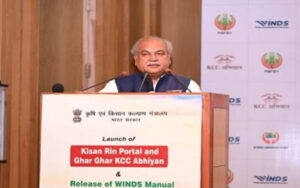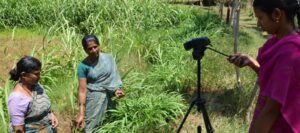Innovative Mobile App & Web Portal for General Crop Estimation Survey to revolutionize farming practices
New Delhi: In-line with the Prime Minister’s vision towards maximizing digital technology for social benefit, Manoj Ahuja, Secretary, Department of Agriculture and Farmers Welfare (DA&FW) launched the mobile application and the web portal for GCES (General Crop Estimation Survey) here. This revolutionary portal and mobile application have been designed to transform agricultural practices across the nation.
Ahuja emphasized on the need of real time estimates and technology in agriculture. He mentioned that the accuracy of the data is a very important component for truthful and reliable outcome generation and the responsibility of ensuring accuracy of the data lies with the data providers as well. Hence, he requested all the states to adopt GCES portal and application to ensure creditability.
Read More: Rupala launches Shrimp Crop Insurance scheme developed by Agricultural Insurance Company
Pramod Kumar Meherda, Additional Secretary, DA&FW stated the successful adaptation of advanced technologies in different sector of agriculture and requested states to adopt the GCES web portal and mobile application completely for better outcome and reliable estimation.
Arun Kumar, Sr Economic and Statistical Adviser extended warm welcome to Secretary, DA&FW and apprised the audience of the major initiatives currently being undertaken at DA&FW to enhance data accuracy and improve digital data governance in agriculture. He added that this momentous initiatives set to herald a new era in the agricultural sector by providing more accurate and real time monitoring of crop yields.
Read More: Annual licensing policy announced for cultivation of opium poppy for MP, Rajasthan and UP
Ms. Ruchika Gupta, Adviser DA&FW shared the salient features of the portal and the mobile application of GCES. It has been developed by Department of Agriculture and Farmers’ Welfare for leveraging technology to enhance the reach, scope, and outcome of government actions in the course of development.
She added that the automation of the GCES process will ensure on time reporting of crop statistics and accuracy of the data. Adviser also mentioned about the agencies involved in conducting CCE in different states are Revenue Department, Agriculture Department and Directorate of Economics &Statistics.
Ms. Sonia Sharma, Additional Statistical Adviser DA&FW presented the revamped process flow of GCES using the web portal and the mobile application, which are currently at pilot stage. The Piloting of these two has been planned in 12 States and will be rollout by 3rd week of October 2023.
Read More: Ensure optimal utilisation of water resources; every drop matters, stresses Dhankhar
Key Challenges Addressed by GCES Web Portal and Mobile Application:
- Delay in Reporting: Till date data collection, compilation and yield estimation is completely manual process which cause delay in reporting by states. In the new process, the field data will be collected using GPS enabled mobile application and will be stored in the server which ensures on time reporting of crop statistics.
- Transparency: GPS enabled devices provide precise latitude and longitude coordinates for data collection points. This information ensures that data is linked to specific geographic locations, leaving no room for ambiguity or manipulation of data regarding where it was collected.
Key Features of the GCES Web Portal and Mobile Application:
- Comprehensive Information: The portal and the app provide a comprehensive repository of yield estimation including village wise GCES plan and plot details where the crop cutting experiments are conducted, post harvesting crop weight and driage weight of the crop.
- Geo-referencing: Geo-referencing is one of the key features of the mobile application, which enables the primary worker to draw the boundary of the experimental plot and upload photos of the plot as well as of the crops through it. This feature will ensure transparency and accuracy of the data as well.

















